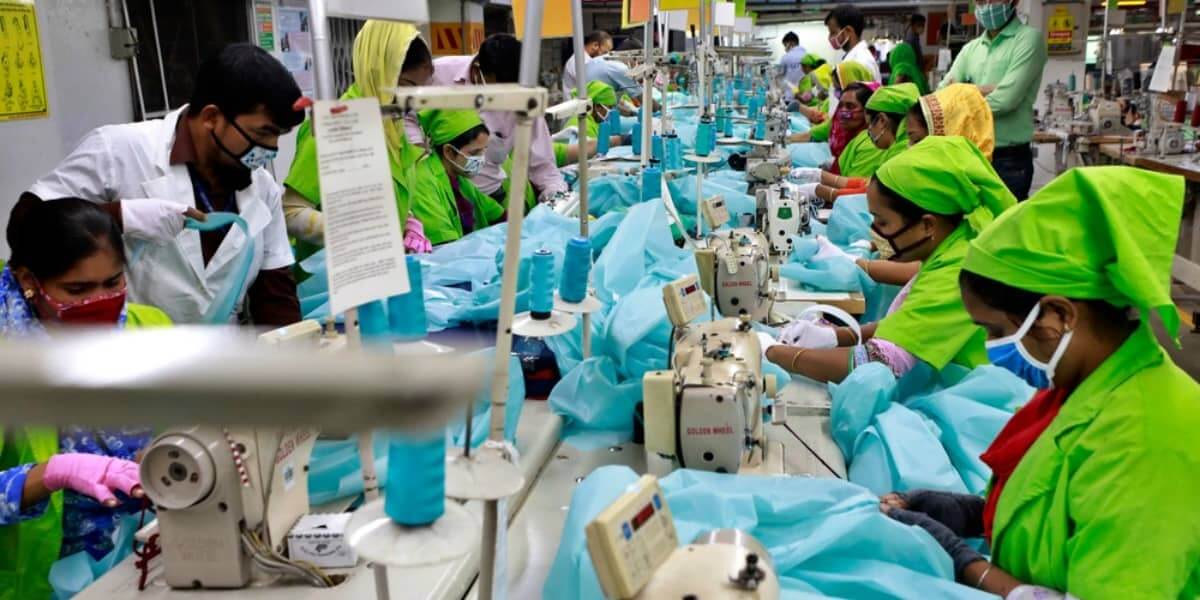70 pct of Bangladesh's garment workers fear losing jobs
Published 02 Oct,2020 via The Financial Express - Seventy per cent of the garment workers surveyed fear losing their jobs because of the coronavirus outbreak, according to a latest report.
It also revealed that 92 per cent of workers reduced their expenses while 60 per cent did not save or use their savings to pay for food to cope up during the pandemic.
"Overwhelmingly 70 per cent of the surveyed workers are very worried or somewhat worried about workers in their factories who lost their job or might lose their job because of the pandemic," said Dr Sanchita Banerjee Saxena, director of Subir and Malini Chowdhury Centre for Bangladesh Studies at the University of California.
She said this while presenting the survey findings at a webinar held on Wednesday night.
Citing Department of Inspection for Factories and Establishments (DIFE), Ms Saxena said over 26,110 workers have been dismissed while 14,132 have been laid off and 155,010 workers have been retrenched since the onset of Covid-19.
BRAC University's Centre for Entrepreneurship Development (CED) organised the webinar titled "Covid-19 Experience: Workers' Perspective" as part of its ongoing rapid survey on the RMG industry in Bangladesh.
CED-BRAC University and BRAC James P Grant School of Public Health (JPGSPH) in association with the Subir and Malini Chowdhury Center for Bangladesh Studies at the University of California, Berkeley recently conducted a rapid survey titled "The Impacts of Covid-19 on the Lives of Workers in the Bangladesh Garment Industry".
Mapped in Bangladesh (MiB) project under CED-BRAC University team leader Rahim B Talukdar chaired the programme and its project manager Syed Hasibuddin Hussain moderated the event. Dhaka University economics department associate professor Dr Atonu Rabbani also spoke at the virtual event.
The survey was conducted between June 30 and July 13 this year. A total of 1,038 garment workers from 225 factories participated in the survey through phone calls, organisers said.
According to the findings, 82 per cent and 52 per cent of workers said their income and savings decreased in April/May compared to that of February respectively.
About 77 per cent replied that it was difficult to feed everyone in their household and 69 per cent ate less of meat, fish and eggs in May compared to February.
Forty per cent ate more pulses while 74 per cent ate about the same amount of rice and wheat during the same period.
Some 87 per cent said their factories have introduced new precautions against the coronavirus, including giving workers new protective equipment (91 per cent), encouraging more hygiene measures (77 per cent), sending workers with symptoms home (66 per cent), and encouraging distance between workers (75per cent).
However, 59 per cent still feel that they are somewhat likely or very likely to get infected with the virus in their factories whereas only 29 per cent think they will contract it in their homes, according to the survey.
Speaking as the chief guest, state minister for labour Begum Monnujan Sufian depicted various steps and initiatives taken by the government to reopen the garment factories keeping the welfare of the workers in mind including implementing the government-declared stimulus packages for the RMG sector, forming crisis committees, providing telemedicine services to workers, formulating health safety guidelines for workers in cooperation with ILO and so on.
The RMG factories in Bangladesh are born to export which makes the situation of the country very unique as large part of the factories do export, economist Dr Wahiduddin Mahmud said.
Thus the way the shocks have been absorbed by the local garment sector are different than other parts of the world, he noted.
As this sector has the highest concentration of workers, it should be seen how to balance the public hygiene as much as possible, he suggested.
Differing with the presenter over retrenchment, Bangladesh Garment Manufacturers and Exporters Association president Dr Rubana Huq said they have a list of 106 factories which retrenched a total of 70,000 workers during the pandemic.
Brands have to be made responsible for the unwanted and the adversities that Bangladesh faced due to the Covid-19 outbreak, she noted.
The industry took necessary initiatives to reopen the factories gradually as per the demand of the economy, she said, praising the government for announcing the stimulus package to pay wages to workers.
She, however, called for a collaboration of all groups to address the existing gap in the sector.
"Workers were the most vulnerable during this Covid-19 pandemic," said Taslima Akhter, coordinator of Bangladesh Garment Workers Solidarity.
Workers are in constant fear of being laid off, she said urging the government and the factory owners to take their responsibilities for the workers.
Copyright © 2020 International Publications Limited. Provided by SyndiGate Media Inc. (Syndigate.info)
DISCLAIMER: This content is provided to us “as is” and unedited by an external third party provider. We cannot attest to or guarantee the accuracy of information provided in this article from the external third party provider. We do not endorse any views or opinions included in this article.
